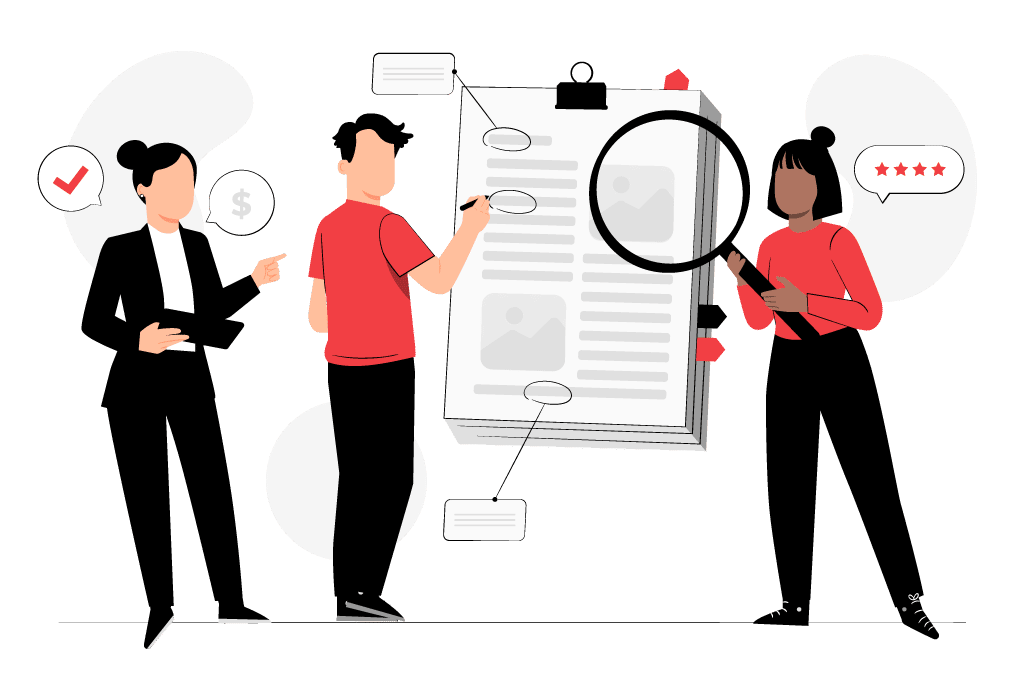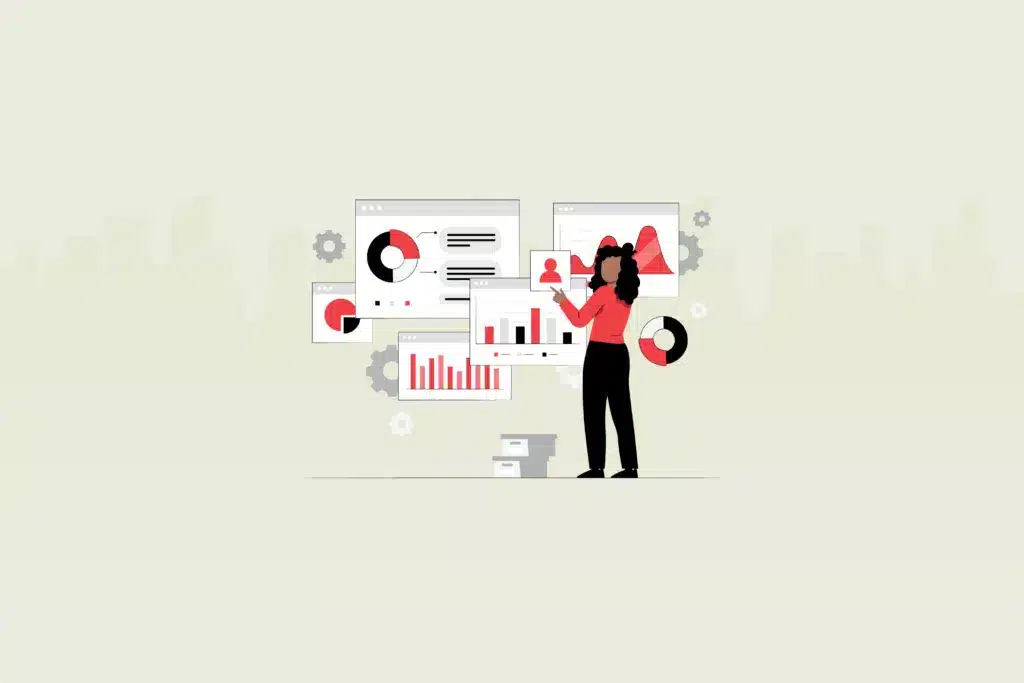In today’s data-driven business landscape, the role of Financial Analyst Assistants has become increasingly crucial in providing valuable insights and supporting informed decision-making. As organizations recognize the importance of accurate financial analysis and forecasting, the demand for skilled and detail-oriented professionals in this field continues to rise.
With the growing availability of advanced analytics tools and the increasing emphasis on leveraging data for strategic initiatives, HR professionals and CXOs are seeking talented Financial Analyst Assistants who possess a strong foundation in finance, proficiency in data analysis, and the ability to communicate complex insights effectively. In this competitive recruiting landscape, finding candidates who can navigate financial data, derive actionable intelligence, and contribute to organizational growth has become a priority for forward-thinking companies.
Here are the top 60 Financial Analyst Assistant interview questions to ask job applicants:
15 general interview questions for the Financial Analyst Assistant
- Can you describe your experience in financial analysis and forecasting?
- How do you stay updated with current market trends and economic indicators that impact financial analysis?
- What tools or software do you use to perform financial analysis and create reports?
- Can you explain a time when you identified a financial risk or opportunity through data analysis?
- How do you ensure accuracy and attention to detail in financial analysis tasks?
- Describe a situation where you had to work with a team to analyze and interpret complex financial data. How did you contribute to the team’s success?
- How do you prioritize and manage multiple financial analysis projects with different deadlines?
- Can you provide an example of a financial analysis report you created that influenced decision-making within an organization?
- How do you approach gathering and validating data for financial analysis purposes?
- Describe a situation where you had to explain complex financial concepts or analysis results to a non-financial audience. How did you ensure their understanding?
- How do you handle unexpected changes or discrepancies in financial data during analysis? Can you provide an example?
- What steps do you take to ensure data security and confidentiality in financial analysis tasks?
- Can you share a situation where you had to make recommendations based on financial analysis findings? How did you support your recommendations?
- How do you handle tight deadlines and pressure when delivering financial analysis reports or insights?
- Can you describe a situation where you identified and implemented process improvements to enhance the efficiency or accuracy of financial analysis tasks?
5 sample answers to general interview questions for the Financial Analyst Assistant
- Can you describe your experience in financial analysis and forecasting?
Look for: A candidate with relevant experience in financial analysis, knowledge of forecasting techniques, and the ability to interpret and analyze financial data.
Example answer: “In my previous role as a Financial Analyst Assistant at XYZ Company, I was responsible for conducting financial analysis and forecasting to support strategic decision-making. I worked closely with senior financial analysts to collect and analyze financial data, identify trends, and develop financial models. I leveraged tools such as Excel and financial software to perform ratio analysis, cash flow forecasting, and variance analysis. By conducting comprehensive research, utilizing historical data, and incorporating industry benchmarks, I contributed to accurate financial forecasts that guided budgeting and investment decisions.”
- How do you stay updated with current market trends and economic indicators that impact financial analysis?
Look for: A candidate who demonstrates a proactive approach to staying informed about market trends, economic indicators, and their impact on financial analysis.
Example answer: “I believe in the importance of staying updated with market trends and economic indicators to perform effective financial analysis. I regularly follow reputable financial news sources, attend webinars and conferences, and participate in industry forums to gather insights. Additionally, I leverage financial research databases and analytical tools to access real-time market data, monitor economic indicators, and understand their implications. For instance, I subscribe to newsletters from leading financial institutions and utilize economic calendars to track key events that could impact financial markets. By actively seeking knowledge and staying informed, I ensure that my financial analyses are grounded in current market conditions and trends.”
- What tools or software do you use to perform financial analysis and create reports?
Look for: Familiarity with financial analysis tools and software commonly used in the industry, such as Excel, financial modeling software, and data visualization tools.
Example answer: “I have a strong proficiency in Excel, utilizing its advanced functions and formulas to perform financial analysis and create dynamic reports. I also have experience with financial modeling software such as Bloomberg Terminal and FactSet, which provide access to extensive financial data and enable sophisticated modeling and analysis. In addition, I am familiar with data visualization tools like Tableau or Power BI, which allow me to present complex financial information in an easily understandable and visually appealing format. By leveraging these tools effectively, I can deliver accurate and visually impactful reports to support decision-making.”
- Can you explain a time when you identified a financial risk or opportunity through data analysis?
Look for: An ability to identify and assess financial risks or opportunities by analyzing data, as well as the candidate’s problem-solving skills.
Example answer: “In a previous project, I was tasked with analyzing the financial performance of a new product line. By conducting a thorough analysis of sales data, production costs, and market trends, I identified a significant cost-saving opportunity in the supply chain. I noticed that particular raw material was being sourced from multiple suppliers at varying prices. By consolidating the sourcing to a single supplier and negotiating a volume discount, we were able to reduce costs by 20% without compromising product quality. This analysis not only identified a financial opportunity but also mitigated potential supply chain risks associated with multiple suppliers. I presented my findings to the management team, and the cost-saving initiative was implemented, resulting in substantial savings for the company.”
- How do you handle tight deadlines and pressure when delivering financial analysis reports or insights?
Look for: Strong time management skills, the ability to work under pressure, and attention to detail even when faced with tight deadlines.
Example answer: “I thrive under pressure and have developed effective strategies to handle tight deadlines when delivering financial analysis reports. First, I prioritize tasks based on urgency and importance, ensuring that critical elements are addressed first. I break down complex analyses into manageable sections and set specific milestones to track progress. To maintain accuracy and attention to detail, I allocate time for thorough quality checks and proofreading. Additionally, I communicate proactively with team members and stakeholders, providing regular updates on progress and potential challenges. By maintaining open communication and being proactive in managing my time, I can deliver high-quality financial analysis reports within tight deadlines while upholding accuracy and quality standards.”
15 behavioral interview questions for a Financial Analyst Assistant
- Tell me about a time when you had to analyze complex financial data to support a business decision. How did you approach the analysis, and what was the outcome?
- Describe a situation where you had to work collaboratively with a team of stakeholders to complete a financial analysis project. How did you contribute to the team’s success?
- Can you provide an example of a time when you had to adapt your financial analysis approach due to unexpected changes or new information? How did you handle it?
- Tell me about a challenging financial analysis task you faced. How did you overcome obstacles or difficulties to achieve the desired outcome?
- Describe a situation where you identified an error or discrepancy in financial data during your analysis. How did you address it, and what were the consequences?
- Can you share an experience when you had to present financial analysis findings to a non-financial audience? How did you ensure their understanding and engagement?
- Describe a time when you had to prioritize multiple financial analysis projects with competing deadlines. How did you manage your time and ensure the timely completion of each project?
- Tell me about a situation where you had to make recommendations based on your financial analysis findings. How did you support your recommendations and gain buy-in from stakeholders?
- Can you provide an example of a time when you identified inefficiencies in existing financial analysis processes? What steps did you take to improve those processes?
- Describe a situation where you had to deal with a challenging stakeholder while conducting a financial analysis. How did you handle the situation and maintain a positive working relationship?
- Tell me about a time when you had to forecast financial outcomes for a project or initiative. How did you ensure the accuracy and reliability of your forecast?
- Describe a situation where you had to manage confidential financial information during your analysis. How did you ensure data security and maintain confidentiality?
- Can you provide an example of a time when you had to analyze financial data from multiple sources and integrate it into a comprehensive report or analysis? How did you ensure data accuracy and consistency?
- Tell me about a time when you identified a financial risk through your analysis. How did you communicate the risk to stakeholders, and what actions were taken to mitigate it?
- Describe a situation where you had to handle competing priorities and requests from different departments or stakeholders while conducting financial analysis. How did you manage expectations and ensure the timely delivery of your work?
5 sample answers to behavioral interview questions for the Financial Analyst Assistant
- Tell me about a time when you had to analyze complex financial data to support a business decision. How did you approach the analysis, and what was the outcome?
Look for: The candidate’s ability to handle complex financial data, their analytical approach, and the impact of their analysis on a business decision.
Example answer: “In my previous role, I was tasked with analyzing the financial feasibility of a potential acquisition. The data provided was extensive and included financial statements, market trends, and industry benchmarks. To approach the analysis, I first organized the data and created a structured framework. I then conducted a ratio analysis, performed a discounted cash flow analysis, and assessed the acquisition’s potential synergies. The outcome of my analysis provided valuable insights into the financial viability of the acquisition, highlighting potential risks and opportunities. Based on my findings, the management team decided to proceed with the acquisition but with certain modifications in the financial terms. Ultimately, my analysis contributed to informed decision-making and ensured that the company made a strategic investment.”
- Describe a situation where you had to work collaboratively with a team of stakeholders to complete a financial analysis project. How did you contribute to the team’s success?
Look for: The candidate’s teamwork and collaboration skills, their ability to work effectively with stakeholders, and their contribution to achieving project goals.
Example answer: “In a recent financial analysis project, I collaborated with cross-functional teams including sales, operations, and finance. Each team had different data sets, and we needed to combine and analyze them to understand the profitability of various product lines. To ensure collaboration and efficiency, I facilitated regular meetings, encouraged open communication, and established clear roles and responsibilities. I took the lead in aggregating the data and created a comprehensive financial model that allowed us to evaluate the profitability of each product line. By actively engaging with stakeholders, addressing their concerns, and incorporating their feedback, we successfully completed the financial analysis project within the given timeframe. Our analysis helped identify underperforming product lines and provided recommendations for cost optimizations, ultimately contributing to improved profitability.”
- Can you provide an example of a time when you had to adapt your financial analysis approach due to unexpected changes or new information? How did you handle it?
Look for: The candidate’s adaptability, problem-solving skills, and ability to adjust their approach in response to unexpected changes or new information.
Example answer: “During a financial analysis project, new information regarding a competitor’s product launch emerged, which significantly impacted the market dynamics. This required me to adapt my analysis approach to account for the potential market share shift. I quickly gathered additional data on the competitor’s product, assessed its potential impact on our market, and adjusted the financial models accordingly. I also collaborated with the sales and marketing teams to gather insights on our response strategies. By incorporating the new information and adjusting the analysis, I provided an updated forecast that accounted for the potential changes in market share. This allowed our company to proactively adjust our marketing and pricing strategies, minimizing potential revenue loss and maintaining a competitive position.”
- Tell me about a challenging financial analysis task you faced. How did you overcome obstacles or difficulties to achieve the desired outcome?
Look for: The candidate’s problem-solving abilities, resilience in the face of challenges, and determination to achieve the desired outcome.
Example answer: “In a previous role, I was assigned a financial analysis task that involved assessing the financial health of a subsidiary that was experiencing declining profitability. The challenge was that the subsidiary had complex financial transactions and intercompany relationships, making it difficult to isolate the key factors contributing to the decline. To overcome this challenge, I conducted in-depth research, reviewed financial statements, and engaged in discussions with key stakeholders, including finance and operations teams. I created detailed financial models to identify the underlying causes of the decline. While it was a complex and time-consuming task, I remained persistent and sought guidance from senior analysts when needed. Ultimately, my analysis revealed issues with the cost structure and pricing strategies, leading to recommendations for operational improvements and pricing adjustments. Overcoming these challenges and providing actionable insights helped the subsidiary regain profitability.”
- Can you share an experience when you had to present financial analysis findings to a non-financial audience? How did you ensure their understanding and engagement?
Look for: The candidate’s communication skills, ability to translate complex financial concepts for a non-financial audience, and strategies for engaging stakeholders.
Example answer: “In a recent project, I was tasked with presenting financial analysis findings to the executive leadership team, which consisted of individuals from diverse backgrounds with limited financial expertise. To ensure their understanding and engagement, I adopted a visual approach and utilized charts, graphs, and infographics to present the key findings and trends. I focused on simplifying complex financial concepts and avoiding jargon, using layman’s terms to explain the insights. Additionally, I prepared a concise executive summary that highlighted the main points and actionable recommendations. During the presentation, I encouraged questions and fostered an interactive discussion to address any concerns and ensure their full comprehension. By adopting a clear and engaging communication style, I successfully conveyed the financial analysis findings to the non-financial audience and facilitated informed decision-making.”
15 personality interview questions for the Financial Analyst Assistant
- How do you prioritize your workload and manage multiple tasks or projects with competing deadlines?
- Can you describe a time when you had to pay close attention to detail in your work as a financial analyst assistant? How did you ensure accuracy and minimize errors?
- How do you handle feedback or criticism on your work? Can you provide an example of a time when you received constructive feedback and how you incorporated it into your performance?
- Tell me about a time when you had to make a decision under uncertainty or with limited information. How did you approach it, and what was the outcome?
- How do you stay organized and ensure that you meet deadlines and commitments in your role as a financial analyst assistant?
- Can you share an experience where you had to adapt to changes in financial regulations or reporting standards? How did you stay informed and ensure compliance in your work?
- How do you approach complex financial problems or challenges? Can you provide an example of a time when you successfully resolved a complex issue?
- Describe a situation where you had to work independently on a financial analysis project. How did you stay motivated and accountable without direct supervision?
- How do you maintain confidentiality and handle sensitive financial information in your role? Can you provide an example of a time when you had to exercise discretion?
- Tell me about a time when you had to present financial analysis findings or reports to a senior executive or client. How did you prepare for the presentation, and what strategies did you use to ensure their understanding?
- Can you provide an example of a time when you had to work with limited resources or a tight budget to complete a financial analysis project? How did you manage the constraints and still deliver quality work?
- How do you approach problem-solving as a financial analyst assistant? Can you describe a time when you had to think creatively to find a solution?
- Tell me about a time when you had to work on a team with conflicting viewpoints or personalities. How did you handle the situation and ensure effective collaboration?
- How do you stay updated with industry trends and developments in the field of financial analysis? Can you provide an example of how your knowledge of industry trends influenced your work?
- Describe a situation where you had to take ownership of a financial analysis project from start to finish. How did you ensure its success and handle any challenges that arose along the way?
5 sample answers to personality interview questions for Financial Analyst Assistant
- How do you prioritize your workload and manage multiple tasks or projects with competing deadlines?
Look for: The candidate’s ability to effectively manage their workload, prioritize tasks, and meet deadlines.
Example answer: “To prioritize my workload and manage multiple tasks with competing deadlines, I employ a systematic approach. First, I assess the urgency and importance of each task. I create a prioritized to-do list or use project management tools to track deadlines. I break down complex projects into smaller, manageable tasks and allocate specific time blocks to work on them. Additionally, I regularly communicate with team members and stakeholders to align expectations and manage timelines. By setting realistic deadlines, organizing my workload, and maintaining open communication, I ensure that I meet deadlines and deliver high-quality work.”
- How do you handle feedback or criticism on your work? Can you provide an example of a time when you received constructive feedback and how you incorporated it into your performance?
Look for: The candidate’s ability to receive feedback positively, their openness to learning and growth, and their ability to incorporate feedback into their work.
Example answer: “I value feedback as an opportunity for growth and improvement. When I receive constructive feedback, I first listen attentively and avoid becoming defensive. I ask clarifying questions to fully understand the feedback and ensure alignment with expectations. Once I grasp the feedback, I reflect on it and identify specific actions I can take to address the areas of improvement. For example, in my previous role, I received feedback about the need to enhance the visual clarity of my financial analysis presentations. I took that feedback seriously and invested time in improving my data visualization skills. I enrolled in an online course, researched best practices, and practiced creating visually engaging charts and graphs. As a result, my subsequent presentations were better received, and stakeholders found the information more accessible and understandable.”
- Can you share an experience where you had to adapt to changes in financial regulations or reporting standards? How did you stay informed and ensure compliance in your work?
Look for: The candidate’s ability to adapt to changes, their commitment to staying updated with regulations, and their approach to ensuring compliance.
Example answer: “In the financial industry, staying updated with regulations and reporting standards is crucial. When faced with changes in financial regulations, I take a proactive approach to ensure compliance. I follow industry news, subscribe to regulatory updates, and attend webinars and seminars to stay informed about the latest changes. For instance, in my previous role, there was a significant change in the accounting treatment of certain financial instruments. To ensure compliance, I thoroughly researched the new standards, attended training sessions provided by our organization, and collaborated with the finance team to implement the necessary changes in our financial reporting processes. By staying informed and taking proactive measures, I ensured that our financial reports remained accurate and compliant with the updated regulations.”
- How do you approach problem-solving as a financial analyst assistant? Can you describe a time when you had to think creatively to find a solution?
Look for: The candidate’s problem-solving skills, their ability to think creatively, and their approach to finding solutions.
Example answer: “When faced with a problem, I approach it by first gathering all relevant information and analyzing the situation from different angles. I break down complex problems into smaller components to identify the root cause. To think creatively, I often brainstorm ideas and encourage team collaboration to leverage diverse perspectives. For instance, in a recent financial analysis project, we encountered discrepancies in the financial data provided by different departments. After conducting a thorough analysis, I realized that there were inconsistencies in the classification of certain expenses. To address this issue, I initiated a cross-functional meeting, where I facilitated open discussions and collaborated with stakeholders to identify the underlying causes and establish standardized expense classifications. By applying creative problem-solving techniques and fostering collaboration, we were able to resolve the issue and ensure accurate financial analysis.”
- Describe a situation where you had to work on a team with conflicting viewpoints or personalities. How did you handle the situation and ensure effective collaboration?
Look for: The candidate’s ability to handle conflicts, their communication and interpersonal skills, and their strategies for promoting effective collaboration.
Example answer: “In a previous project, I was part of a financial analysis team where team members had conflicting viewpoints and personalities. To handle the situation, I first acknowledged the importance of open communication and mutual respect. I initiated team meetings where I encouraged everyone to express their viewpoints and ensured that everyone felt heard and valued. I facilitated constructive discussions and worked towards finding common ground and areas of agreement. Additionally, I sought to leverage each team member’s strengths and assigned tasks based on their expertise, which helped in fostering collaboration and avoiding unnecessary conflicts. By promoting effective communication, respecting differing opinions, and finding ways to leverage our collective strengths, we were able to overcome the initial conflicts and successfully complete the financial analysis project.”
When should you use skill assessments in your hiring process for Financial Analyst Assistant?
Skill assessments are a valuable tool to incorporate into the hiring process for Financial Analyst Assistants. These assessments provide objective measures of a candidate’s skills, allowing employers to make more informed decisions about their qualifications and fit for the role. By using skill assessments, employers can ensure that candidates possess the necessary technical and analytical competencies required for success in the position.
Assessments are important because they provide an unbiased evaluation of a candidate’s abilities. They go beyond what can be gleaned from resumes and interviews, allowing employers to gauge a candidate’s proficiency in areas such as financial analysis, data interpretation, financial modeling, and spreadsheet skills. Skill assessments provide concrete evidence of a candidate’s capabilities, helping employers to identify top performers and minimize the risk of hiring individuals who may not have the requisite skills for the role.
There are various assessments that can be used to assess the skills of Financial Analyst Assistants. These may include financial modeling tests, data analysis exercises, Excel proficiency assessments, and scenario-based assessments that simulate real-world financial analysis scenarios. These assessments are designed to evaluate a candidate’s ability to analyze financial data, interpret trends, make informed recommendations, and demonstrate technical proficiency in relevant tools and software. By incorporating skill assessments into the hiring process, employers can ensure that candidates possess the necessary skills and competencies to excel in the role of a Financial Analyst Assistant.
Use our interview questions and skill tests to hire a talented Financial Analyst Assistant
Unlock the potential of your hiring process with Testlify’s comprehensive skill assessments and interview questions specifically designed for Financial Analyst Assistant.
Our extensive test library offers a wide range of assessments, including cognitive function, personality, situational judgment, programming, and more. By leveraging these assessments, you can objectively evaluate candidates’ abilities, ensuring you shortlist the most talented individuals efficiently.
To further enhance your hiring process, we invite you to book a free 30-minute live demo. Our expert team will guide you through the platform, showcasing relevant skill tests tailored to your hiring needs. With our support, you can streamline candidate selection, saving valuable time and resources.
Ready to find the perfect fit for your Financial Analyst Assistant role? Testlify provides the tools you need to make informed hiring decisions. Explore our skill assessments and interview questions today to uncover exceptional talent for your team.








